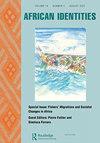Government response to COVID-19 vaccination in Nigeria: identifying key issues over rollout from a public perspective
Q1 Social Sciences
引用次数: 0
Abstract
There are concerns about the COVID-19 vaccine's safety, reliability, and efficacy. Previous studies on vaccine hesitancy focused on public perception and factors influencing behavior but little is known about how government response affects acceptance and distribution efforts. Consequently, the present study is focused on providing answers to the question regarding the challenges induced by the Nigerian governments' response to the COVID-19 vaccine distribution and acceptance process. Utilizing an interpretative phenomenological analysis (IPA), Findings showed that even though there are strategies designed to ensure effective rollout of the COVID-19 vaccines to the target populations, the plans are not well laid out. Corruption risks and facility deficiency are the likely problems that might affect efficient COVID-19 vaccine equitable distribution to the target groups. The findings' practical implications indicate that the Nigerian government and other stakeholders ought to make improvements in a number of areas to enable a successful and equitable distribution of the COVID-19 vaccine. This entails enhancing the online registration process, enhancing communication techniques, tackling corruption threats, assuring a steady supply of electricity, and providing employees with the necessary tools and training. [ FROM AUTHOR] Copyright of African Identities is the property of Routledge and its content may not be copied or emailed to multiple sites or posted to a listserv without the copyright holder's express written permission. However, users may print, download, or email articles for individual use. This may be abridged. No warranty is given about the accuracy of the copy. Users should refer to the original published version of the material for the full . (Copyright applies to all s.)尼日利亚政府应对新冠肺炎疫苗接种:从公众角度确定推广的关键问题
人们担心新冠肺炎疫苗的安全性、可靠性和有效性。先前关于疫苗犹豫的研究集中在公众认知和影响行为的因素上,但对政府反应如何影响接受和分发工作知之甚少。因此,本研究的重点是为尼日利亚政府应对新冠肺炎疫苗分发和接受过程所带来的挑战提供答案。利用解释性现象学分析(IPA),研究结果表明,尽管制定了确保向目标人群有效推广新冠肺炎疫苗的策略,但这些计划并没有得到很好的制定。腐败风险和设施不足是可能影响新冠肺炎疫苗向目标群体的有效公平分配的问题。研究结果的实际影响表明,尼日利亚政府和其他利益攸关方应在多个领域做出改进,以使新冠肺炎疫苗能够成功公平分配。这需要加强在线注册程序,加强通信技术,应对腐败威胁,确保稳定的电力供应,并为员工提供必要的工具和培训。[发件人]非洲身份的版权归Routledge所有,未经版权持有人明确书面许可,不得将其内容复制或通过电子邮件发送到多个网站或发布到listserv。但是,用户可以打印、下载或通过电子邮件发送文章供个人使用。这可能会被删节。对复印件的准确性不作任何保证。用户应参考材料的原始发布版本以获取完整信息。(版权适用于所有人。)
本文章由计算机程序翻译,如有差异,请以英文原文为准。
求助全文
约1分钟内获得全文
求助全文

 求助内容:
求助内容: 应助结果提醒方式:
应助结果提醒方式:


